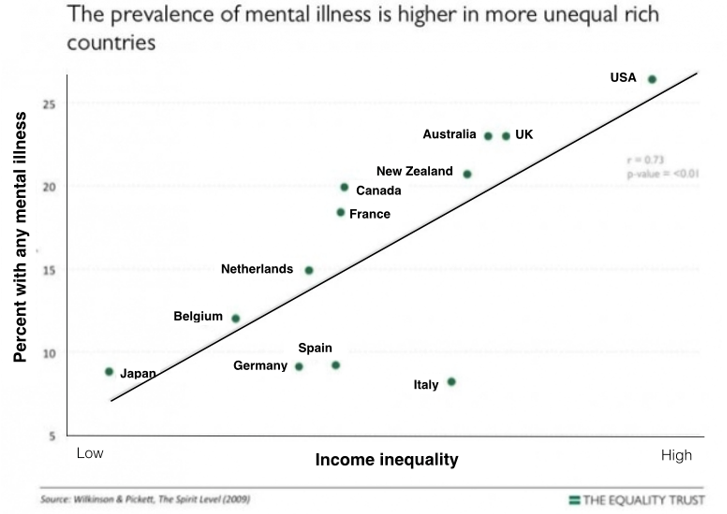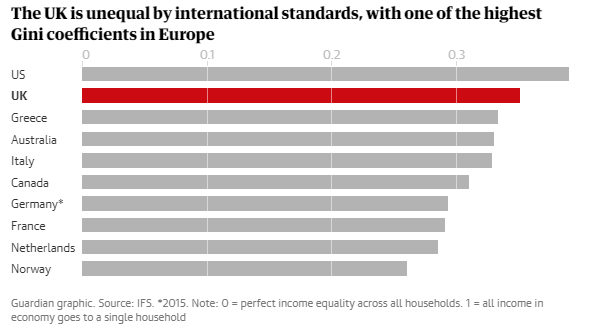Inequality & Mental Health: The Missing Link

Two things caught our attention this week.
First off, Nobel prize-winning Economist Angus Deaton launched a review into inequality.
Secondly, it’s been UK mental health awareness week.
These two topics are directly related.
Ten years ago, academic couple Richard Wilkinson and Kate Pickett published their best-selling book The Spirit Level. In it they lay numerous societal ills, ranging from higher violent crime rates to low economic productivity, all at the feet of one beast – inequality.
But their follow-up, published last year, argues that the devastation wreaked by inequality goes even further. The Inner Level outlines how more unequal societies also suffer from worsening psychological health on top of poorer physical wellbeing. With the US and UK topping the charts with populations who suffer more from a range of mental health issues including chronic stress, anxiety, bipolar disorder and addiction.

Graph 1
The UK is one of the most unequal countries in the world. Research from Oxfam found the five richest families in this country are wealthier than the bottom 20% of our entire population. And this gap is widening still. Incomes for the richest 0.1% have risen at four times the rate for those in the bottom 90% in the last twenty years.
Meanwhile the Institute for Fiscal Studies (IFS), the think tank behind Deaton’s study, warns that the UK is “at risk of following the US” in its extreme levels of inequality across income, wealth and health.

Graph 2
But whilst the IFS and Deaton note that “deaths of despair”; those caused by addiction and suicide, are rising in poorer segments of the population, we wish they’d go further still and try as Wilkinson and Pickett do, to make the connection between wealth and mental health even clearer. And perhaps they will when the review concludes in 2020.
In the meantime, with 1 in 4 people in England experiencing a mental health problem every year, the mere scale of this issue, if not the horrific impact of it, should be grabbing more attention.
As mental health awareness week draws to a close, for many it’s been a great opportunity to start conversations and share personal stories about mental health – a wonderful thing that we definitely need more of! However, it’s also important to reflect on the causes behind poor mental health too and it is clear inequality is one of those. Especially as the relationship between money worries and poor mental health seems to be growing even stronger for younger generations.
At the root of this rising inequality sits our money and banking system. Banks create most of the money in our economy, and most of it is used to bid up the prices of financial assets. Those assets are held predominantly by the better-off and so, as the price of them rises, wealth gets even more concentrated in the hands of the rich. To close the gap between rich and poor, we have to fix this broken system and get banks working for the whole of society, not just an elite few.
There are reasons for optimism; this week New Zealand became the world’s first country to announce a ‘well-being’ budget focused on poverty and mental health, but this is only the beginning. In our vision for a brighter future, personal wellbeing will sit right at the heart of a more sustainable, democratic and fairer economy but we must tackle the twin beasts of inequality and our broken financial system before we can get there.